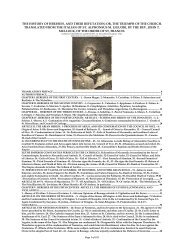The Writings of St. Francis of Assisi - + Saints' Works
The Writings of St. Francis of Assisi - + Saints' Works
The Writings of St. Francis of Assisi - + Saints' Works
You also want an ePaper? Increase the reach of your titles
YUMPU automatically turns print PDFs into web optimized ePapers that Google loves.
THE WRITINGS OF ST. FRANCIS OF ASSISI<br />
putting the hand to the plow and looking backwards is fit for the Kingdom <strong>of</strong> God" (Lk 9:62). · If<br />
however anyone has come who cannot give his own (possessions) without impediment 362 and he<br />
has a spiritual will, 363 let him forsake 364 these, and (this) suffices for him. · Let no one be received<br />
against the form and arrangement <strong>of</strong> Holy Church. 365<br />
Indeed let the other friars, who have promised obedience, have one tunic with a capuche<br />
and another without a capuche, if the necessity has arisen, 366 and a cord and breeches. · And let<br />
all the friars wear cheep vestments, and let them be able to patch these with sacks and other<br />
pieces (<strong>of</strong> cloth) with the blessing <strong>of</strong> God; because the Lord says in the Gospel: "Those who are<br />
in precious garments and among delights" (Lk 7:25) and "those who are dressed in s<strong>of</strong>t (clothes),<br />
are in the houses <strong>of</strong> kings" (Mt 11:8). · And though they be called hypocrites, let them not<br />
however cease doing good nor seek costly clothes in this world (saeculum), so that they can have<br />
(their) raiment 367 in the Kingdom <strong>of</strong> Heaven.<br />
Chapter III<br />
On the Divine Office and fasting<br />
<strong>The</strong> Lord says: "This kind" <strong>of</strong> demon "cannot go forth except in" fasting and prayer (cf.<br />
Mk 9:28); · and again: "When you fast do not make yourselves sad like hypocrites" (Mt 6:16).<br />
On this account let all the friars, whether clerics or lay, perform 368 the Divine Office, 369<br />
the praises and the prayers, 370 in the manner they ought to perform it. · Let the clerics perform the<br />
Office and say on behalf <strong>of</strong> the living and the dead (what) is according to the custom <strong>of</strong> the<br />
clergy. · And for the failing and negligence <strong>of</strong> the friars let them say every day a Miserere mei<br />
Deus (Ps 50) with a Pater noster; 371 · and on behalf <strong>of</strong> the departed friars let them say the De<br />
pr<strong>of</strong>undis (Ps 129) with a Pater noster. · And let them be able to have only the books necessary to<br />
fulfill their <strong>of</strong>fice. 372 · And let it be licit for the lay (brothers, who) know how to read the Psalter,<br />
to have 373 one for themselves. · Indeed let it not be licit to the other (brothers, who) do not know<br />
how to read, to have a book. · Let the lay (brothers) say the Credo in Deum 374 and twenty-four<br />
362 e.g. in those cases in which property rights were shared with others.<br />
363 i.e. good will.<br />
364 i.e. renounce his own rights to them.<br />
365 i.e. against ecclesiastical law.<br />
366 <strong>St</strong>. <strong>Francis</strong> uses the perfect subjunctive si necesse fuerit, here translated as "if the necessity has<br />
arisen," to indicate that the second tunic should not be granted in view <strong>of</strong> future necessity, but<br />
only after such necessity has occurred.<br />
367 A reference to the white stole <strong>of</strong> glory worn by the Saints in heaven (cf. Apoc 7:9-10,13-17).<br />
368 see fn. 277.<br />
369 see fn. 278.<br />
370 A reference to the customary prayers <strong>of</strong> the Order, e.g. "<strong>The</strong> Praises to be said at every hour"<br />
[LaudHor].<br />
371 i.e. the Our Father.<br />
372 Whether that be only for the liturgical Office or also for the duties <strong>of</strong> preaching, teaching, or<br />
hearing confession, etc. is not clear; the use <strong>of</strong> eorum, (translated here as "their") in this context<br />
implies the latter.<br />
373 i.e. to have the use <strong>of</strong> one; for the meaning <strong>of</strong> "Psalter" see fn. 280.<br />
374 <strong>The</strong> Apostles Creed.<br />
Page - 85













